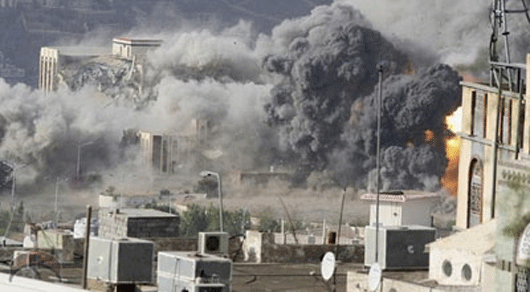
By Emma Graham-Harrison
British and American military officials are in the command and control center for Saudi airstrikes on Yemen, and have access to lists of targets, although they do not play any role in choosing them, the Saudi Arabian foreign minister has said.
Human rights groups, the European parliament and the UN have all expressed concerns about airstrikes by a Saudi-led coalition in Yemen---.
Nearly 3,000 civilians have been killed in Yemen since full-blown civil war broke out in March, according to the UN. A million other people have been displaced and the country is now at serious risk of famine.
The UK government has been put on notice that it is in breach of international law for allowing the export of British-made missiles and military equipment to Saudi Arabia that might have been used to kill civilians.
The UK Ministry of Defence confirmed that British forces were in the operation room to provide training and advice "on best practice targeting techniques to help ensure continued compliance with international humanitarian law", under a long-standing arrangement, but said they did not have an operational role.
"UK military personnel are not directly involved in Saudi-led Coalition operations," a spokeswoman said.
The Saudi foreign minister, Adel al-Jubeir, said his country had nothing to hide. A host of foreign officials have been posted to the Yemen command and control center, he said, have been able to scrutinize its air campaign, and were satisfied by its safeguards.
"We have British officials and American officials and officials from other countries in our command and control center. They know what the target list is and they have a sense of what it is that we are doing and what we are not doing," he told journalists in London after meeting British ministers and US secretary of state, John Kerry.
The foreign military officers did not play any role in choosing targets, Jubeir said. "We pick the targets, they don’t. I don’t know technically exactly what part of the process they are in, but I do know they are aware of the target lists."
"The idea is that it should be transparent, we don’t want people to say ’what are you doing," Jubeir said. "We have nothing to hide."
He also said that Saudi Arabia used smart bombs for precision targeting, assessed the aftermath of every strike and corrected any flaws in its process. "The notion that we are bombing civilians indiscriminately is a) not born out by the facts and b) is not fair," he said.
Amnesty International has warned of "a pattern of appalling disregard for civilian lives displayed by the Saudi Arabia-led military coalition" and the UN has expressed similar concerns. Last year Saudi-led coalition strikes hit a Médecins Sans Frontières mobile clinic and hospital and several schools. Saudi coalition strikes are alleged to have targeted electricity and water plants.
Lawyers acting for the Campaign Against the Arms Trade [CAAT] have stepped up legal proceedings against the Department for Business, Innovation and Skills, which approves export licenses, accusing it of failing in its legal duty to take steps to prevent and suppress violations of international humanitarian law.
Jubeir said Saudi Arabia’s partners were satisfied their checks to protect civilians were sufficient, pointing to recent comments by his British counterpart, Philip Hammond, who this week told parliament that British officers were working with the Saudi military to make sure they did not violate international humanitarian law.
"We do have a military presence in Saudi Arabia, and we are working with the Saudi Arabians to ensure the following of correct procedures to avoid breaches of international humanitarian law," Hammond said in response to a question from the shadow foreign secretary, Hilary Benn.
"It is shocking to discover that our government has embroiled British personnel in the targeting process that is creating this mayhem. More disturbingly, we’re learning about the UK’s involvement not from the our government, but from the Saudi authorities who now appear to be more transparent than their British counterparts.
"Crucial questions remain unanswered: whose command are British personnel in the Saudi operations centre under - British or Saudi? Are they ’embedded’ personnel referred to in the defence secretary’s vague December statement, which stated that 94 British personnel were embedded in ’coalition HQs?’ And what part have ministers played in signing off their activities? The British public has a right to know."